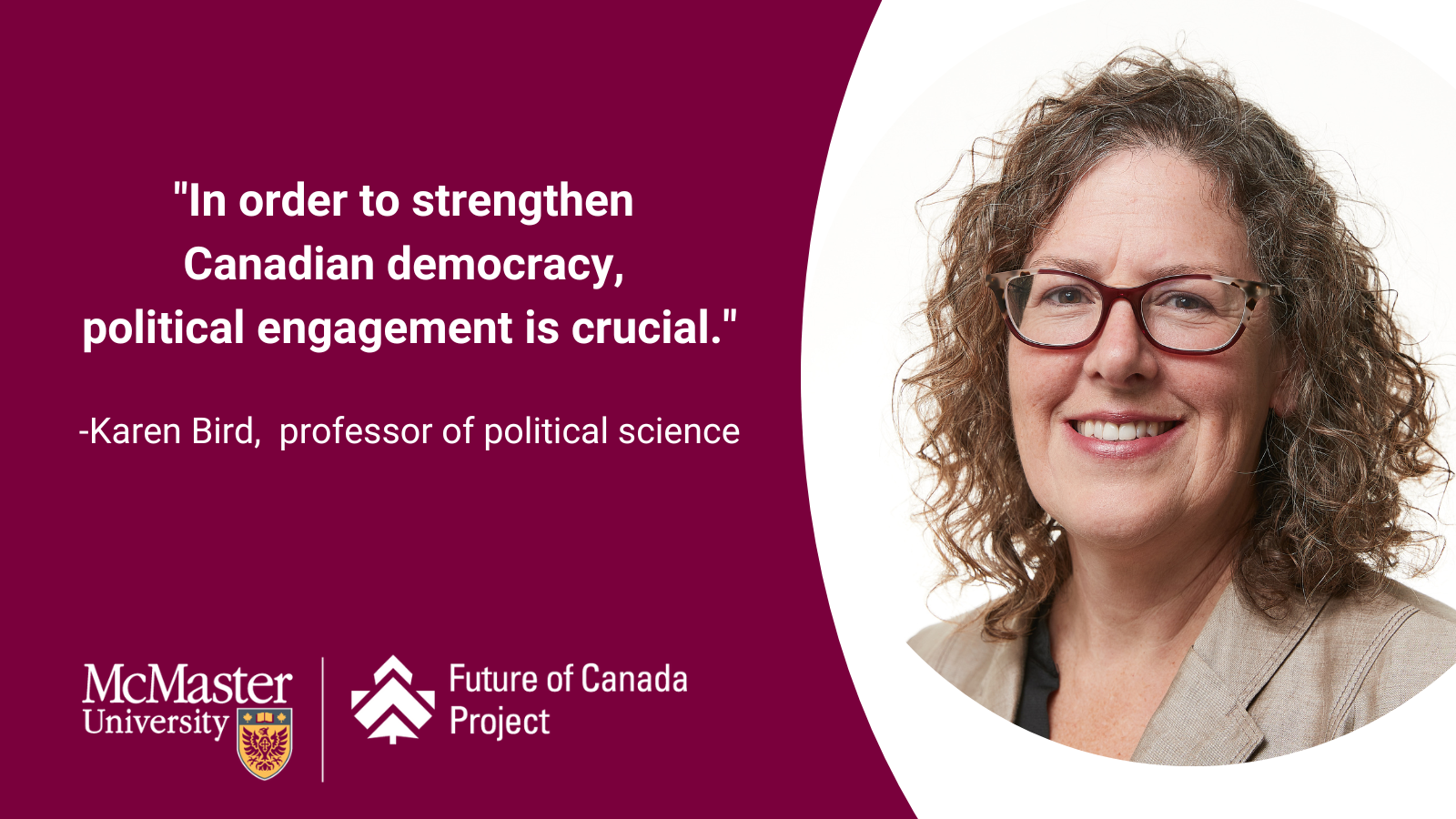Diverse political candidates and voter engagement

We asked Karen Bird—the principal investigator for Future of Canada Project Diversity, Social Media Framing and the Personalized Candidacy in Canadian Elections: An Experimental Analysis—to answer some of the big questions that are guiding her project team’s research.
How does having political candidates from more diverse backgrounds impact the democratic process?
In order to strengthen Canadian democracy, political engagement is crucial. Our study focuses on groups that have been historically marginalized and looks at their engagement both as candidates and voters.
We will be investigating how the democratic process is impacted when voters are from the same identity group as a candidate. In other words, if we share an “identity affinity” with a candidate running on our local riding—for example, as a gay person we find out that there is also a gay candidate, or as a Black person we see there is a Black candidate running – we may become more interested, more likely to turn out on election day, and perhaps feel more positive about the electoral and democratic system generally.
How does social media play a role in how voters perceive candidates?
In principle, social media allows candidates greater scope than traditional media to reach diverse voters and provides a space where they can personalize their candidacy and emphasize their identity. But not all candidates use it in this way.
For example, investigating how Black candidates Tweet in the course of a campaign, we find that very few actually talk about their race or racial issues; rather, most focus on their party and its platform. To the extent that they personalize their candidacy, they tend to focus on their education and professional background and downplay the experience of being a racialized person.
And there is also a dark side to social media. In interviews as part of our broader research project, we know that diverse candidates are subject to online racism and misogyny. So we know that social media can be a tool for outreach and engagement with diverse voters, but the toxicity of online behaviour is also capable of driving diverse candidates away and weakening our democracy.
Do candidates feel they can openly speak about their identities?
My team and I are struck by how candidates for elected office seem constrained in how they can speak about their identities and lived experience as members of marginalized communities.
For example, it is not until very recently that LGBTQ candidates could be open about their identities. Likewise, some racialized candidates appear hesitant to include an image of their face on their campaign signs, and are quick to point out that they are “as mainstream as anyone else”. Yet some candidates do put greater focus on their identity backgrounds.
What accounts for this? And what impact do these choices have – especially in terms of engaging diverse citizens in the political process? Our research can help answer these questions.
How do voters from certain identity groups respond to candidates who share their identity?
Our project aims to explore the conditions that impact how people respond to candidates who share their identity. We will be investigating how candidates express their personal identities and how this is either emphasized or downplayed in the media (or by the candidate themselves). We expect that if a candidate more overtly expresses their identity, they’ll have higher engagement with voters of their identity group.
The riding and neighbourhood-level context is another factor. Whether the voter becomes mobilized by a shared candidate-voter identity may differ depending on whether their identity group comprises a very small minority, or a larger share of the riding demographics. If part of a small minority, voters might perceive the candidate’s explicit identity expression as more genuine or “authentic”, while if their identity group is large, it might be discounted as an “instrumental” vote-chasing strategy.
How the voter assesses expressions of candidate identity in different situations should in turn have implications for their feelings of trust and willingness to engage in the voting process.
Future of Canada Project funding allows us to assess these and other hypotheses through a survey experiment that will investigate the impact on voter perceptions, engagement, trust, political efficacy, and related effects of seeing local candidates who share your identity and how this varies across different groups.
So do women, queer, Black or Indigenous voters feel more included in the political process when there is a woman, queer, Black or Indigenous candidate running in their local riding? Furthermore, do they like these candidates more, and evaluate them more positively than other candidates?
We will also review how candidates talk about their identity in social media and examine how this impacts mobilization and feelings of democratic inclusion.
The project is important as our research results have the potential to strengthen arguments about the role of diversity in Canada’s political bodies and may lead to higher levels of political participation, particularly among those who have traditionally felt marginalized and disenfranchised by the absence of role models with whom the identify.
Why is it important to explore the impact of diverse candidates in local elections in Canada?
Understanding the impact of diverse candidates running in local campaigns is critical in multicultural countries with parliamentary systems like Canada, where citizens mark their ballot for a local candidate (rather than for parties or candidate slates).
While leaders and parties are important to citizens’ vote choices, there is much to learn about the impact that local candidate identity may have on broader forms of political engagement (turnout, interest and political participation).
The results of our research will be shared with non-academic audiences (political parties, journalists and advocacy organizations) to enable them to better understand their campaign and journalistic choices, capitalize on positive effects, and reduce/eliminate activities that may result in additional barriers to the political engagement of under-represented groups in Canadian politics.
Watch this space for to learn more about other 2022-23 Future of Canada Projects that are currently underway.
Future of Canada Project Profile

